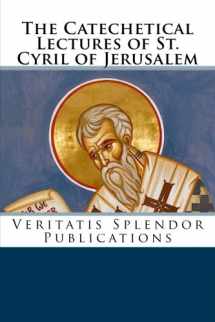
The Catechetical Lectures of St. Cyril of Jerusalem
Book details
Summary
Description
St. Cyril of Jerusalem - Bishop of Jerusalem and Doctor of the Church, born about 315; died probably 18 March, 386. In the East his feast is observed on the 18th of March, in the West on the 18th or 20th. Little is known of his life. St. Cyril's doctrine is expressed in his creed, which seems to have run thus: I believe in one God, the Father Almighty, Creator of Heaven and earth and of all things visible and invisible. And in one Lord Jesus Christ, the only-begotten Son of God, begotten by the Father true God before all ages, God of God, Life of Life, Light of Light, by Whom all things were made. Who for us men and for our salvation came down, and was incarnate by the Holy Ghost and the Virgin Mary, and was made man. He was crucified . . . and buried. He rose again on the third day according to the Scriptures, and sat at the right hand of the Father. And He cometh in glory to judge the living and the dead, whose kingdom shall have no end. And in one Holy Ghost, the Paraclete, Who spake by the prophets; and in one baptism of repentance for the remission of sins, and in one holy Catholic Church, and in the resurrection of the body, and in life everlasting. St. Cyril teaches the Divinity of the Son with perfect plainness, but avoids the word "consubstantial", which he probably thought liable to misunderstanding. He never mentions Arianism, though he denounces the Arian formula, "There was a time when the Son was not". He belonged to the Semi-Arian, or Homoean party, and is content to declare that the Son is "in all things like the Father". He communicated freely with bishops such a Basil of Ancyra and Eustathius of Sebaste. He not only does not explain that the Holy Trinity has one Godhead, but he does not even say the Three Persons are one God. The one God for him is always the Father. "There is one God, the Father of Christ, and one Lord Jesus Christ, the only-begotten Son of the only God, and one Holy Ghost, Who sanctifies and deifies all things" (Cat. iv, 16). But he rightly says: "We do not divide the Holy Trinity as some do, neither do we make a melting into one like Sabellius" (Cat. xvi, 4). Cyril never actually calls the Holy Ghost God, but He is to be honoured together with the Father and the Son (Cat. iv, 16). There is therefore nothing incorrect in his doctrine, only the explicit use of the Nicene formulae is wanting, and these, like St. Meletius and others of his party, he fully accepted at a later date. St. Cyril's teaching about the Blessed Sacrament is of the first importance, for he was speaking freely, untrammelled by the "discipline of the secret". On the Real Presence he is unambiguous: "Since He Himself has declared and said of the bread: This is My Body, who shall dare to doubt any more? And when He asserts and says: This is My Blood, who shall ever hesitate and say it is not His Blood?" Of the Transformation, he argues, if Christ could change water into wine, can He not change wine into His own Blood? The bread and wine are symbols: "In the type of bread is given thee the Body, in the type of wine the Blood is given thee"; but they do not remain in their original condition, they have been changed, though the senses cannot tell us this: "Do not think it mere bread and wine, for it is the Body and Blood of Christ, according to the Lord's declaration". "Having learned this and being assured of it, that appears to be bread is not bread, though perceived by the taste, but the Body of Christ, and what appears to be wine is not wine, though the taste says so, but the Blood of Christ . . . strengthen thy heart, partaking of it as spiritual (food), and rejoice the face of thy soul". It is difficult not to see the whole doctrine of Transubstantiation in these explicit words.


We would LOVE it if you could help us and other readers by reviewing the book
Book review



